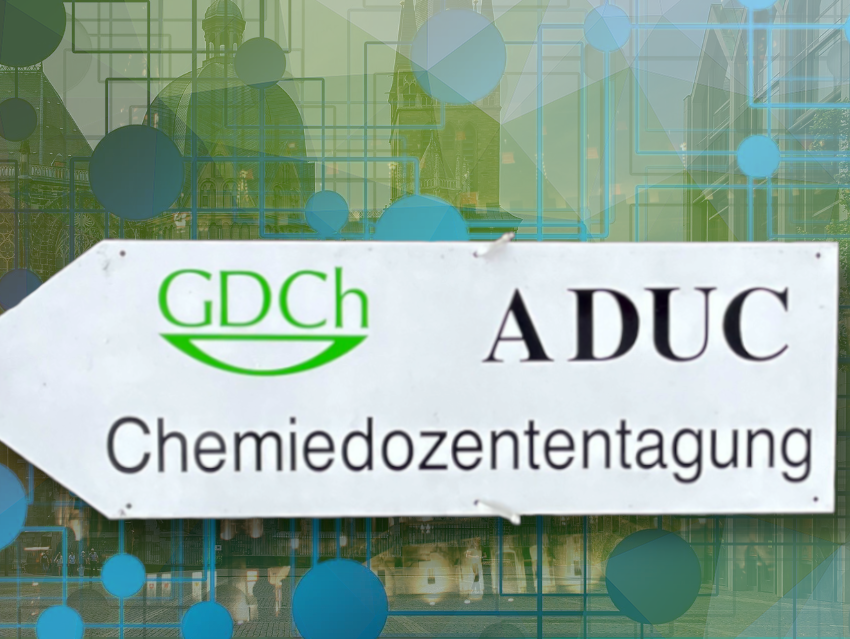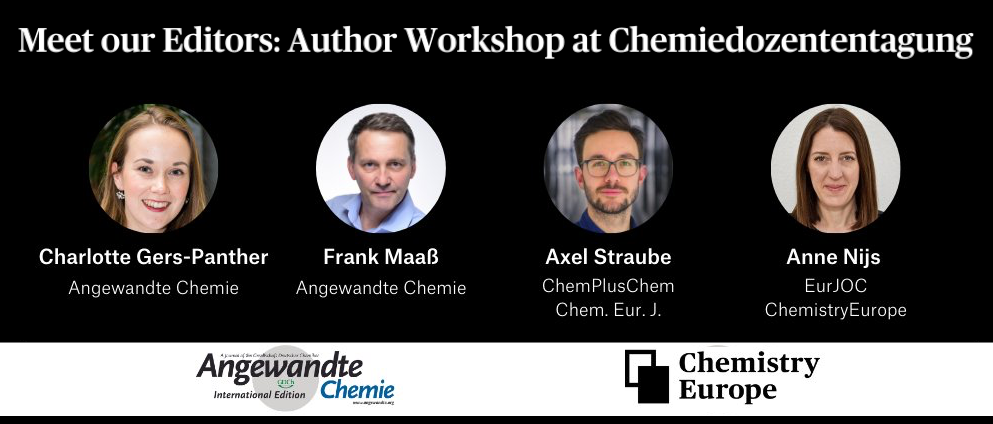1 Arriving in the Community of Academics in Germany
Young academics from all areas of chemistry, a great atmosphere, fruitful exchanges and discussions about research and the challenges of the academic-system, Aachen gingerbread, perfect organization despite a bridge closure, train strike, and rain … This year’s Chemiedozententagung (CDT) took place from March 11-13, 2024 at RWTH Aachen, Germany. The event is held annually as a meeting of chemistry professors, giving junior professors an opportunity to present their research and engage in discussions with more senior academics.
Traditionally, the meeting has been used to fill open positions within the German-speaking university system. In view of upcoming vacencies, some suggest considering an expansion of the conference to include sections for postdocs to get to know good candidates early on. Another related topic of concern is the declining number of chemistry students at most universities.
Stephanie Dehnen, President of the German Chemical Society (GDCh) and Professor at KIT Karlsruhe, highlighted the vital role of international scientific cooperation in addressing global challenges during the conference opening. She emphasized the importance of openness and democracy in the scientific community, noting that the integrity of scientific research must be vigilantly protected. To this end, the GDCh, along with other scientific societies in Germany, united under the motto “Science connects” to express concern over anti-democratic and nationalistic trends [1], which threaten both inclusivity and scientific advancement. The societies stress the importance of cosmopolitanism, democracy, and the rule of law for scientific progress. They advocate for open discourse, oppose any restrictions on international collaboration, and urge members to advocate for a democratic society and free science.
Personal experience plays an important role in shaping our lives, as we learn and grow from our mistakes and failures. Trust and flexibility in personal experiences is important. A meeting like this can support this.
The meeting was organized by the professors of the Department of Chemistry of RWTH Aachen University under the chairmanship of Professor Sonja Herres-Pawlis and the ADUC (Arbeitsgemeinschaft Deutscher Universitätsprofessoren und -professorinnen für Chemie/Association of German University Professors of Chemistry). Founded in 1897 as an association of laboratory directors, ADUC became a working group of the GDCh in 1999. Its responsibilities include shaping the direction of chemistry in research and academia and coordinating events such as the CDT.
In Aachen, some 250 participants engaged in discussions and attended nearly 100 presentations across three concurrent sessions. The scientific topics covered a wide range including analytical methods, biological chemistry, electrochemistry, main group chemistry, MOF/COFs, nanochemistry, photochemistry, polymer chemistry, solid-state chemistry, supramolecular chemistry, synthetic methods, theoretical chemistry, and transition metal chemistry.
2 Selected Talks
2.1 Responsibility of Academic Research
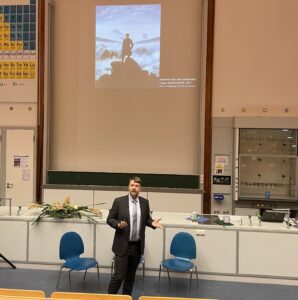 A slide with Caspar David Friedrich‘s “Wanderer above the Sea of Fog”. Title: “Research, Teaching, Keep Going?”
A slide with Caspar David Friedrich‘s “Wanderer above the Sea of Fog”. Title: “Research, Teaching, Keep Going?”
How to give a lecture on the role and responsibility of academic research and teaching concerning topics such as the climate crisis, health, prosperity, social peace, tensions between extreme positions? Professor Sebastian Seiffert, Johannes Gutenberg-University Mainz, moved between data and personal insights, convictions, and approaches. “Driven by curiosity to gain insight into the foggy sea of ignorance, where we as humans stand climate-wise,” could be a description of his manner of engagement with the topic. Or, to put it more simply, critically reflecting on one’s own opinion in light of the available data.
He then begins his talk with startling data: The Earth’s daily surface temperature was significantly higher last year than in any year since industrialization (see Fig. 1) [2]. The effect is even more pronounced for the daily sea surface temperature (see Fig. 2) [3], and in February 2023, Antarctic sea ice reached a record minimum, meaning that there have now been three record-low sea ice summers in seven years [4]. We know the data, and as he says, dealing with the subject brought him to the brink of depression before he found his way to respond.
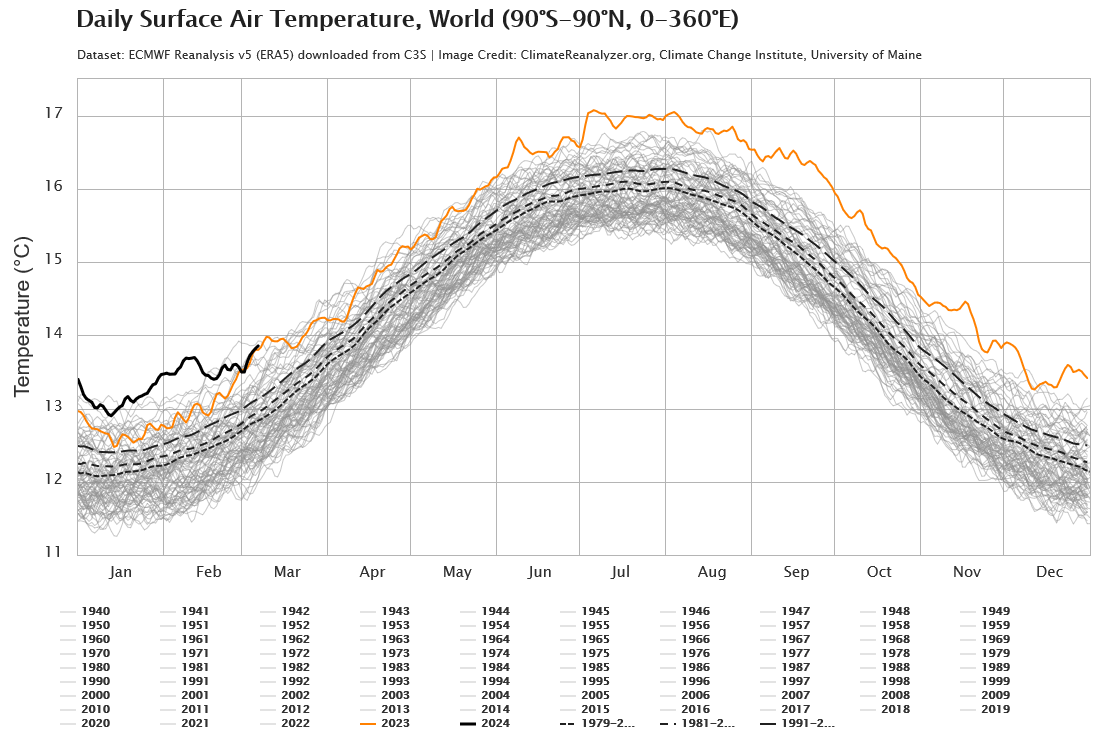
Figure 1. Daily mean surface air temperature (2-meter height; °C) for the period January 1940 to present. Credit: Copernicus Climate Change Service/ECMWF.
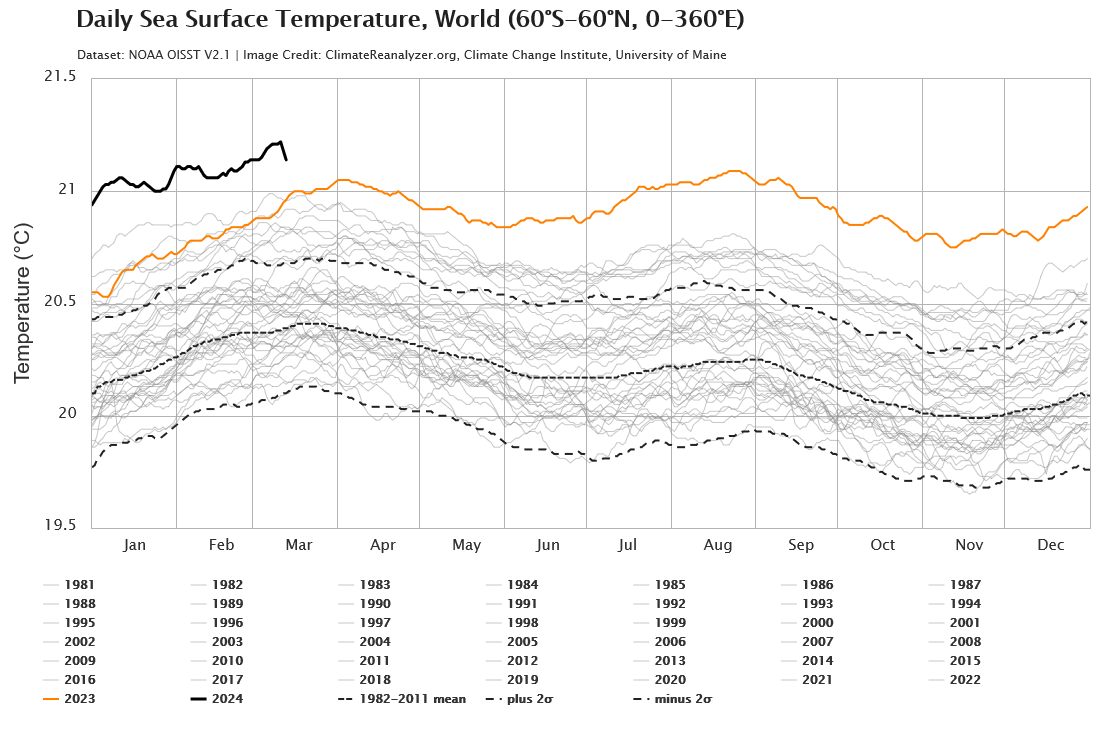
Figure 2. Daily mean sea surface temperature (°C) averaged over the extra-polar global ocean (60°S–60°N). Data source: ERA5. Credit: Copernicus Climate Change Service/ECMWF
Science is passion in the positive sense: research, teaching, publishing, conference trips, … 100 % concentration on one’s own research topic, on one’s own research environment, on one’s own research perspectives. But, as Sebastian Seiffert says, one should not lose sight of the big picture, because that is increasingly becoming a problem, and increasingly, science itself becomes the main focus instead.
For him, the question is, “How can your research really help to solve problems?” His approach is based on using research not only to try to understand, but also to consider what might help. He provides an example from his research on water scarcity: He used his research to develop hydrogels for desalinating seawater. He created switchable materials that can be used in a temperature-dependent manner, making it possible to use the day/night cycle to autonomously supply small settlements with water—swelling during the day, deswelling at night [5].
He is now often referred to as a climate activist. Initially, this annoyed him, and he found it discrediting. Today, he believes we are all activists because we all play an active role, following the statement: “Physics applies to everyone, even those who don’t understand it.” We all have a shared democratic responsibility. The good thing is that one doesn’t have to do it alone, and from his experience, he can say that he encounters the most wonderful people—open-hearted, optimistic, idealistic. We need more activists, optimists, and active engagement.
2.2 Digital Transformation of Chemistry
Every day we are flooded with reports about the remarkable but also worrying achievements of artificial intelligence (AI) and, of course, this also includes chemistry, with the vision of digital and automated chemistry to make scientific work easier and faster. Professor Stefan Bräse, Karlsruhe Institute of Technology (KIT), discussed the opportunities and challenges of digitalized and automated chemistry. He explained how he and his group enhanced efficiency, reproducibility, and openness in experimental chemistry by integrating software for research data management (RDM) workflows for FAIR (findable, accessible, interoperable, and reusable) data and by implementing automation concepts to standardize and improve all experimental aspects of their work. As an experimental chemistry group, their work processes include designing, synthesizing, and analyzing small to medium-sized organic (sometimes metal-organic) molecules.
He presented research data management (RDM) methods in academia, such as using electronic lab notebooks (ELNs) like Chemotion and LabIMotion, along with the Chemotion repository. Examples illustrated how to convert data into standardized formats, extract metadata, and analyze chemical data using integrated, open-source tools [6-9].
The combination of digitalization and automation is illustrated through ChemASAP (automated synthesis and analysis platform), which aims to automate chemical synthesis, support high throughput experimentation, and establish databases for advanced data analysis tools. ChemASAP is currently under construction as a research infrastructure at KIT [10]. As illustrated in Figure 3, materials acceleration platforms are integrated systems designed to speed up processes by combining technologies such as robotic materials synthesis, characterization with AI-driven data analysis, experimental design, and advanced simulation techniques.
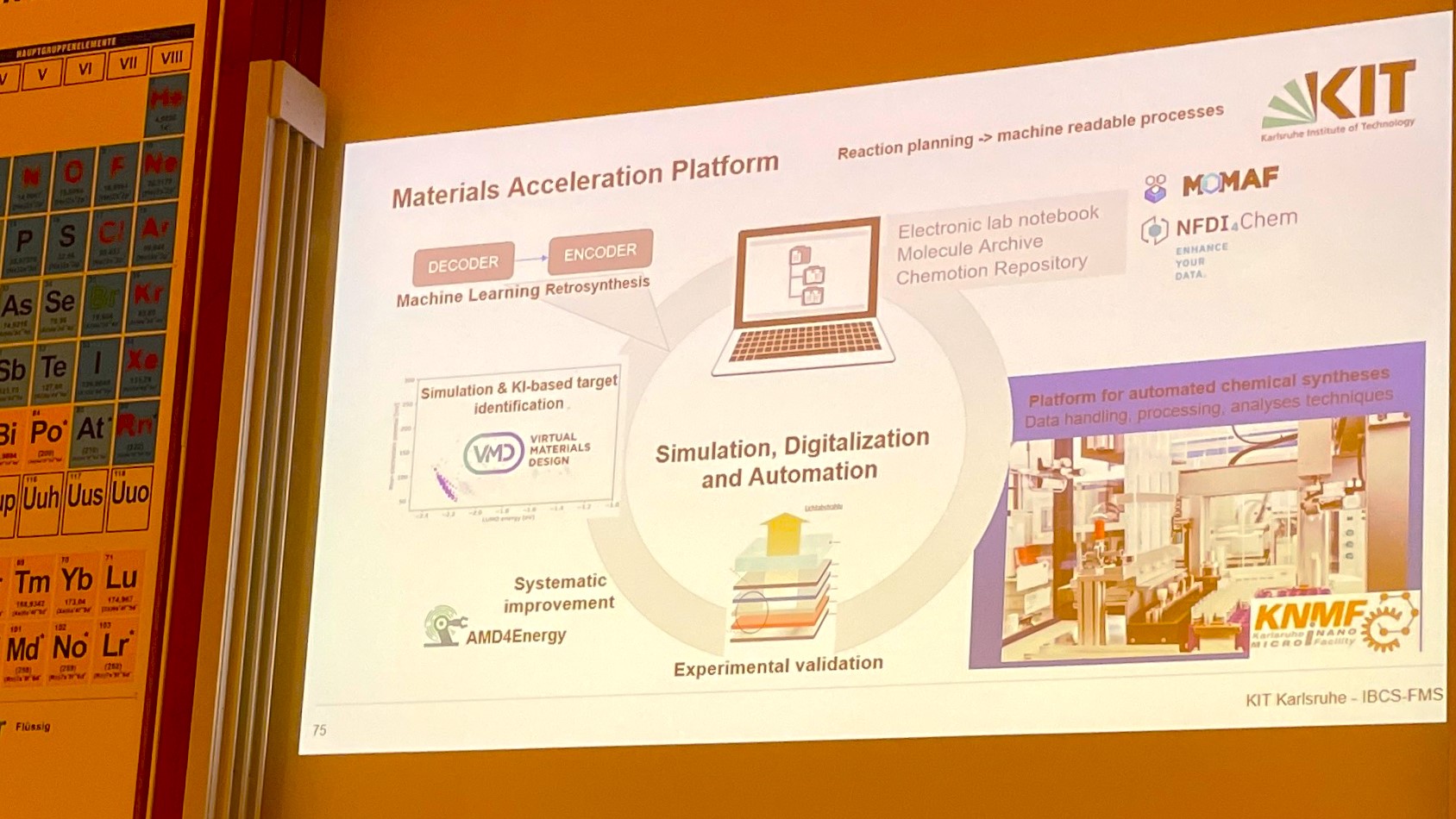 Figure 3. Materials acceleration platform.
Figure 3. Materials acceleration platform.
2.3 FAIR Data and AI in Publishing
The Editors4Chem @CDT plenary discussion focused on the transformative impact of the FAIR Data Principles and the impact of AI on publishing. The FAIR Principles, which call for scientific data to be made findable, accessible, interoperable, and reusable, aim to facilitate the sharing and reuse of research data, thereby promoting transparency, collaboration, and innovation in science and academia. Data are becoming increasingly important and play a growing role in chemistry.
The National Research Data Infrastructure (NFDI; Nationale Forschungsdateninfrastruktur) is an initiative of the German federal and state governments. Its goal is to create an interdisciplinary network that enables the sustainable management of research data in accordance with the FAIR guidelines. The chemistry consortium NFDI4Chem aims to digitize the entire workflow in chemical research. Starting with the provision of open-source electronic laboratory notebooks (ELNs), through the development of standards, interfaces, and tools, NFDI4Chem aims to close the analog gaps in the digital data lifecycle.
IUPAC is leading the WorldFAIR Chemistry project in a concerted effort to collaborate with related disciplines and data scientists to support the broader sharing of chemical data and the use of chemical data standards in research workflows, aiming to promote data sharing and reuse through practical resources.
Publishers and funding agencies are also beginning to set requirements for FAIR research. Publishers play an important role in ensuring the accessibility and reproducibility of research data by sharing, linking, and citing data alongside publications—and in determining the role of research data in the broader research ecosystem.
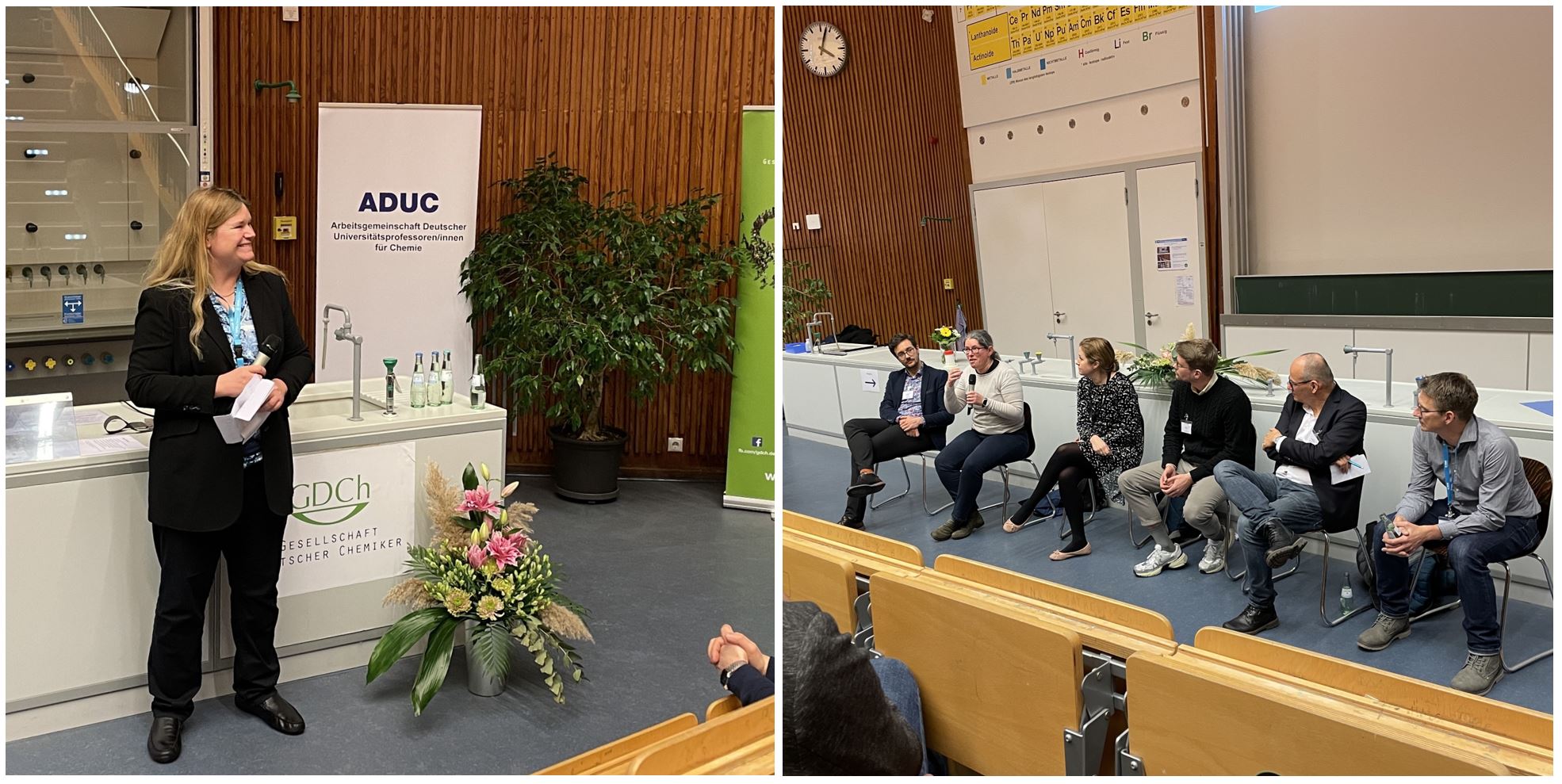 Figure 4. Professor Sonja Herres-Pawlis and panel (from left to right): Axel Straube (Wiley-VCH), Greta Heydenrych (IUPAC), Aimee Nixon (DeGruyter), Marc Kielmann (Beilstein-Institut), Jochen Johannsen (University Library RWTH), and Daniel Pursche (DFG).
Figure 4. Professor Sonja Herres-Pawlis and panel (from left to right): Axel Straube (Wiley-VCH), Greta Heydenrych (IUPAC), Aimee Nixon (DeGruyter), Marc Kielmann (Beilstein-Institut), Jochen Johannsen (University Library RWTH), and Daniel Pursche (DFG).
Panelists Dr. Greta Heydenrych, IUPAC, Dr. phil. Jochen Johannsen, University Library RWTH, Dr. Marc Kielmann, Beilstein-Institute, Aimee Nixon, DeGruyter, Dr. Daniel Pursche, DFG (German Research Foundation/Deutsche Forschungsgemeinschaft), and Dr. Axel Straube, Wiley-VCH, emphasized the many benefits of FAIR data sharing. Key to the FAIR Data Principles is the need for a collaborative approach to making scientific data more functional in the future and to developing robust standards. There are benefits for all when the results of research are properly managed, preserved, accessible, and reusable, thereby increasing their overall value. It is important to adopt standards and guidelines to improve adoption and provide incentives to encourage more authors to adopt FAIR data management practices.
Additionally, participants highlighted the potential of AI in streamlining research and publication processes, despite acknowledging challenges such as copyright issues and bias and, therefore, the need for human oversight. Ultimately, the discussion underscored the necessity for interdisciplinary collaboration and a cultural shift towards embracing open science to ensure transparency and efficiency in research endeavors.
|
Making research data more FAIR is a community effort. Our journals, published on behalf of the European Chemical Societies, work closely with community-led initiatives such as NFDI4Chem and NFDI4Cat, as well as monitoring IUPAC recommendations and developments among science funding agencies. Based on this valuable input, we are already providing guidance on suitable repositories and how best to report data. All of our journals mandate the inclusion of a Data Availability Statement, and while there is much room for improvement, we see encouraging signs of more open practices across our portfolio. We will continue our efforts in this direction, including improving our submission and publication workflows and engaging in community outreach. Dr. Axel Straube, Wiley-VCH |
3 Workshops on Applications, Data Management, Digitization, Funding, Publishing
At the event, participants had the opportunity to attend workshops covering various topics. These included scientific publishing, where editors from Angewandte Chemie and Chemistry Europe journals offered insights into the publishing process. Additionally, workshops hosted by NFDI4Chem focused on chemistry data, highlighting advances in data management and digitization and their impact on the field. Another workshop, hosted by DHV (Deutscher Hochschulverband/German University Association), provided guidance on applying for academic positions. Furthermore, participants learned in a DFG workshop about funding opportunities in the DFG Individual Grants Program, gaining tips for successful grant applications.
|
We gave a workshop at the Chemiedozententagung titled “Scientific Publishing – A Sit Down with Chemistry Europe and Angewandte Chemie editors”. We, that is, Charlotte Gers-Panther, Anne Nijs, Axel Straube, and Frank Maaß. The idea was to move from a classical presentation to a format that allows for interaction with the audience—a bit of a hybrid between a podium discussion and a presentation. We showed six slides on selected topics, such as, for example, peer review and publication ethics. For each slide, we gave a brief introduction and then asked for questions. And it worked! The audience (around 50 participants) was very engaged, interested, and constructive. I think the success of such a format hinges on the location and the number of participants. In our case, it was a relatively small lecture room, a big hall would probably not work well. Yet you need a critical mass of participants, of course. Dr. Frank Maaß, Wiley-VCH |
4 Eminent Persons and Research
4.1 Contributing to the Chemical Community
The Primo Levi Prize, jointly awarded by the GDCh and the Italian Chemical Society (Società Chimica Italiana, SCI), is named in honor of the Italian Jewish chemist, writer, and Holocaust survivor Primo Levi. It recognizes individuals in chemistry or related fields who demonstrate exceptional dedication to safeguarding human rights and fostering dialogue between chemistry and society.
Professor Henning Hopf, Braunschweig, received the award for his significant and continuous contributions to both the chemical community and society in general [11]. The award ceremony had already taken place at the WiFo in Leipzig in 2023 with representatives of the SCI and Primo Levi’s son [12]. However, due to health reasons, Henning Hopf was unable to attend, so the award was now ceremonially presented to him. He was moved to tears when the audience couldn’t stop applauding.
Dr. Eva E. Wille, Weinheim, was awarded the Gmelin-Beilstein Memorial Medal 2024 in recognition of her successful promotion of literature on chemical history and the classification of various areas of chemistry in a historical context, especially during the era of National Socialism [13].
She is significantly involved in the book series “Lives in Chemistry”, of which volumes on Henri Brunner, Franz Effenberger, Gerhard Ertl, Stephen B. H. Kent, Horst Kessler, Guenther Maier, Dieter Oesterhelt, and Larry E. Overman have been published to date. Thanks to a donation of Professor Dieter Jahn, GDCh President 2006/2007, each speaker at the CDT was able to receive a copy of this series. [14] The series is steered by an Advisory Board that has been appointed by the Executive Committee of the History of Chemistry Division of the GDCh and is a non-profit project run by volunteers.
The award ceremony was followed by a short discussion. Among other things, both prizewinners spoke in favor of an international edition of the book “The Chemist in the Third Reich” [15], which should be supplemented by further findings. Commissioned by the GDCh, the book examines the history of the precursor organizations of the GDCh, with particular emphasis on the era of National Socialism.
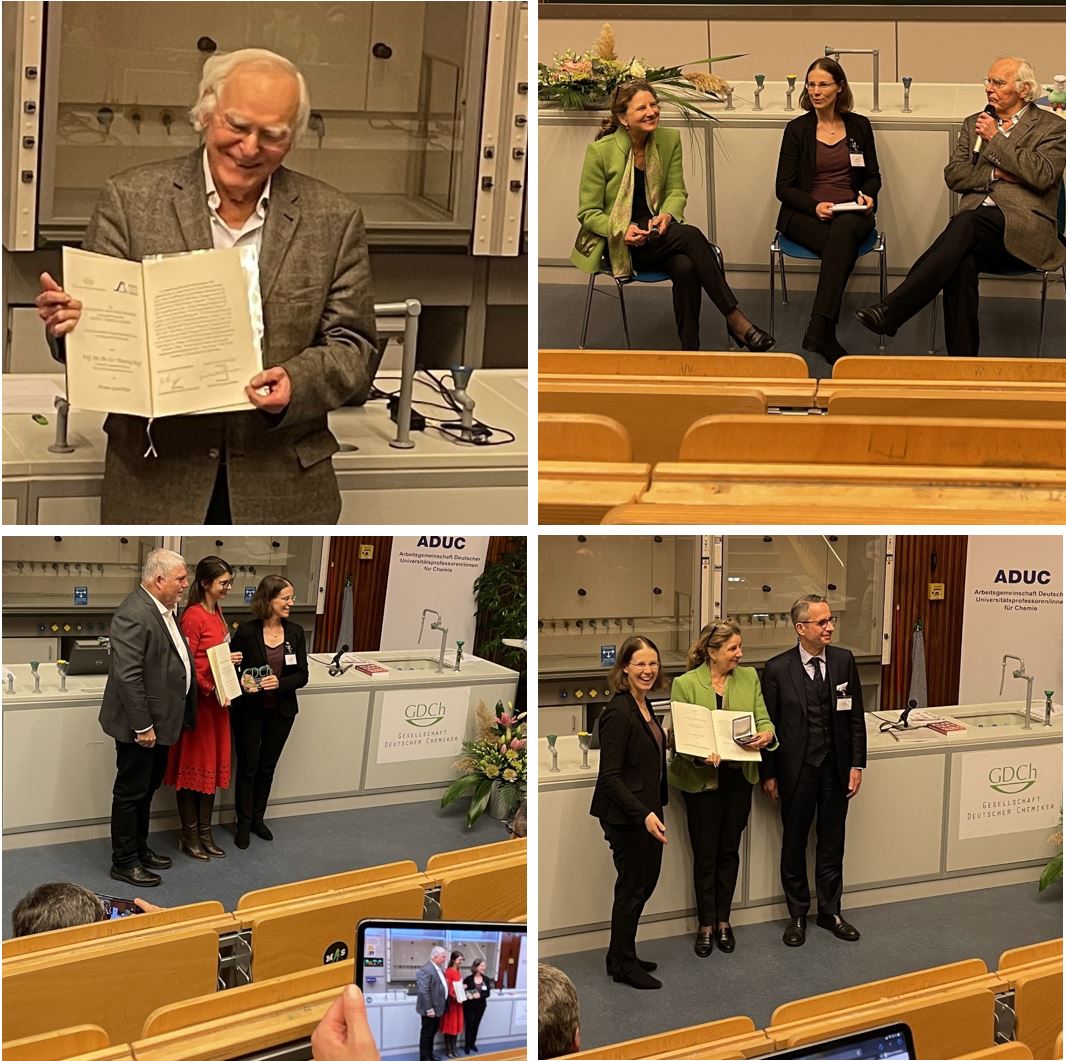
Figure 5. From top left to bottom right: Primo Levi Prize recipient Henning Hopf; Stephanie Dehnen interviews the laureates Eva Wille and Henning Hopf; Laudator Professor Wolfgang Schuhmann (Ruhr Universität Bochum), Corina Andronescu, and Stephanie Dehnen; Stephanie Dehnen, Eva Wille, and Laudator Dr. Guido F. Herrmann (Wiley-VCH).
4.2 Stable Electrocatalytic Materials
The Carl Duisberg Memorial Award honors young academics in the field of chemistry. Professor Corina Andronescu, University of Duisburg-Essen, received the award for her pioneering work on electrocatalytic reactions for energy conversion using high-throughput screening of new catalyst materials, nanoelectrochemical methods, and characterization in model electrolyzers.
Corina Andronescu’s research centers on developing stable electrocatalytic materials for energy conversion and storage, particularly focusing on their long-term stability and electrode structure in electrolysis. Her patented approach uses self-organizing nanoparticles for catalyst film stability, recognized with an invention prize from Ruhr-University Bochum. Currently, she and her group explore electrochemical CO2 reduction, aiming to convert it directly into valuable chemicals like ethylene or ethanol.
She has just received tenure and started as a W2 professor on March 1, 2024.
4.3 C–H Bond Cleavage and Fluorinated Cyclopentadienyl Ligands
The ADUC awards up to three prizes to outstanding young scientists for the establishment of an independent field of research. The awardees are eligible up to a maximum of six years after completion of the Ph.D. and before taking up a tenure track professorship. This year, Dr. Jola Pospech, Junior Research Group Leader at the Leibniz Institute for Catalysis (LIKAT), Rostock, and Dr. Moritz Malischewski, Junior Research Group Leader at FU Berlin, were honored.
Jola Pospech’s research focuses on the study of organocatalytic direct functionalization reactions by C–H bond cleavage based on one-electron processes and transition metal-catalyzed stereoselective difunctionalization of olefins. She presented a method to selectively add oxygen functionalities to organic molecules by generating mesyl radicals (MsO•) through photoinduced electron transfer (PET). This allows the rapid construction of complex structures via benzylic C–H bond functionalization using oxidative radical-polar cross-over (ORPC).
Moritz Malischewski’s research focuses on the coordination chemistry of fluorinated cyclopentadienyl (Cp) ligands. He coordinated the perfluorinated Cp* anion [C5(CF3)5]−, previously difficult to coordinate due to its low nucleophilicity, to the cationic rhodium cyclooctadiene fragment [Rh(COD)]+ to form [Rh{C5(CF3)5}(COD)] [16]. This ligand shows weak binding, allowing easy substitution by toluene, fluorinated pyridines, or triphenylpnictogens. Its high oxidative stability also allows the isolation of stable coinage metal Cp complexes [tBu3PM{C5(CF3)5}] (M = Cu, Ag, Au) and the synthesis of the mixed ferrocene [(C5H5)Fe{C5(CF3)5}].
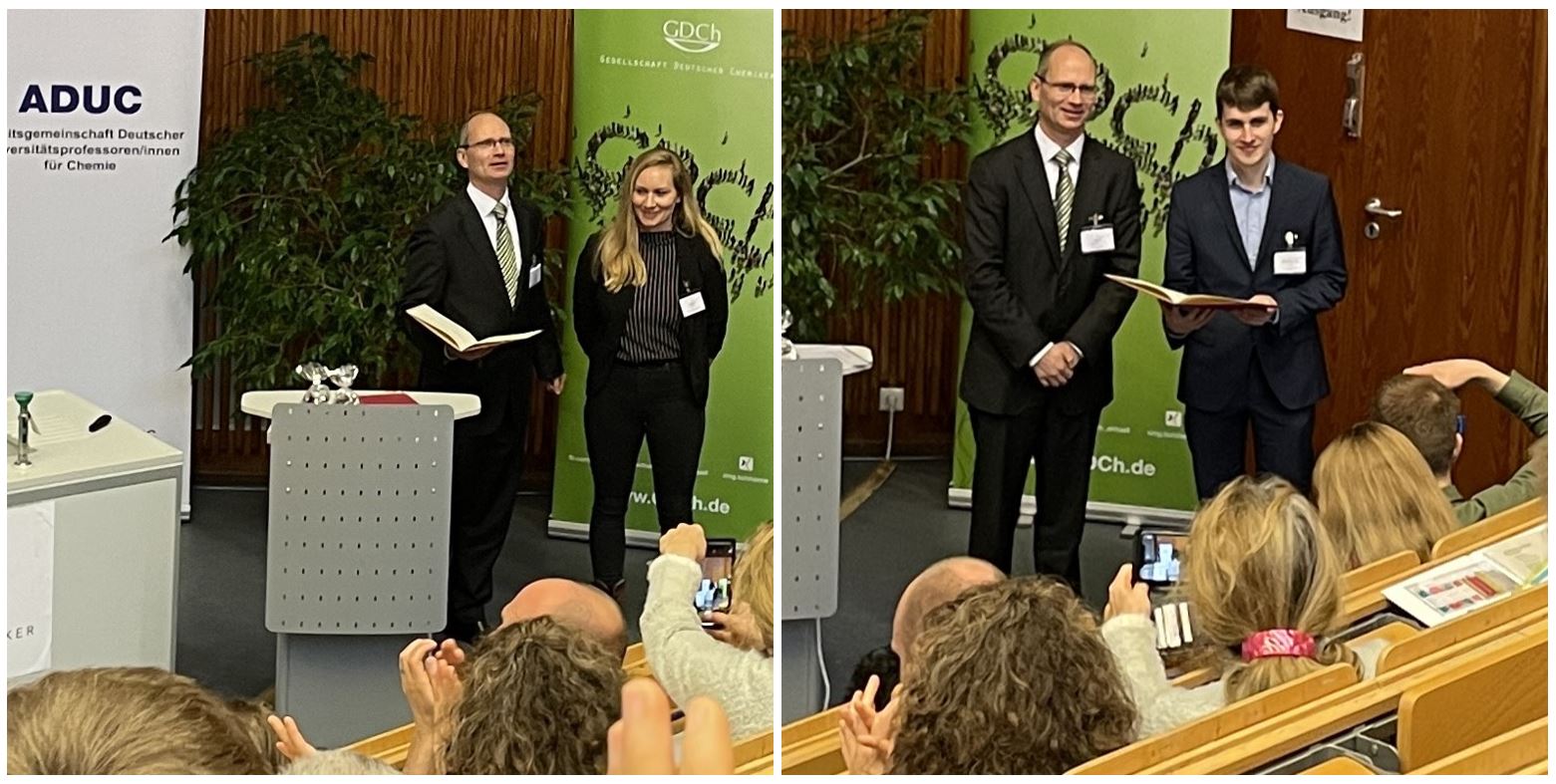 Figure 6. Hans-Dieter Arndt, Chairman of ADUC and a professor at Friedrich Schiller University Jena, with ADUC awardees.
Figure 6. Hans-Dieter Arndt, Chairman of ADUC and a professor at Friedrich Schiller University Jena, with ADUC awardees.
5 Closing Each Day and Anticipating the Upcoming CDT
The discussions continued in the evenings, e.g., at a get-together in a seminar room of RWTH (first evening) or at the conference dinner (second evening). The conference dinner took place in the Ratskeller directly at the market on the ground floor of Aachen City Hall. The Gothic town hall, built in the first half of the 14th century, is—along with the cathedral—the most prominent building in Aachen’s historic city center. It is considered the architectural model for many town halls of this period in the Flanders region. The dinner took place in the beautiful vaulted cellar, amidst a great atmosphere among the participants, and many continued in smaller groups afterward at different locations throughout the city.
Some of the participants you work with or are friends with, others you will soon meet again at the next conference. Some, however, you will not see again until the next CDT. It will be organized by Professor Thomas Lindel and his team at TU Braunschweig on March 17–19, 2025. The CDT was last in Braunschweig in 1963.

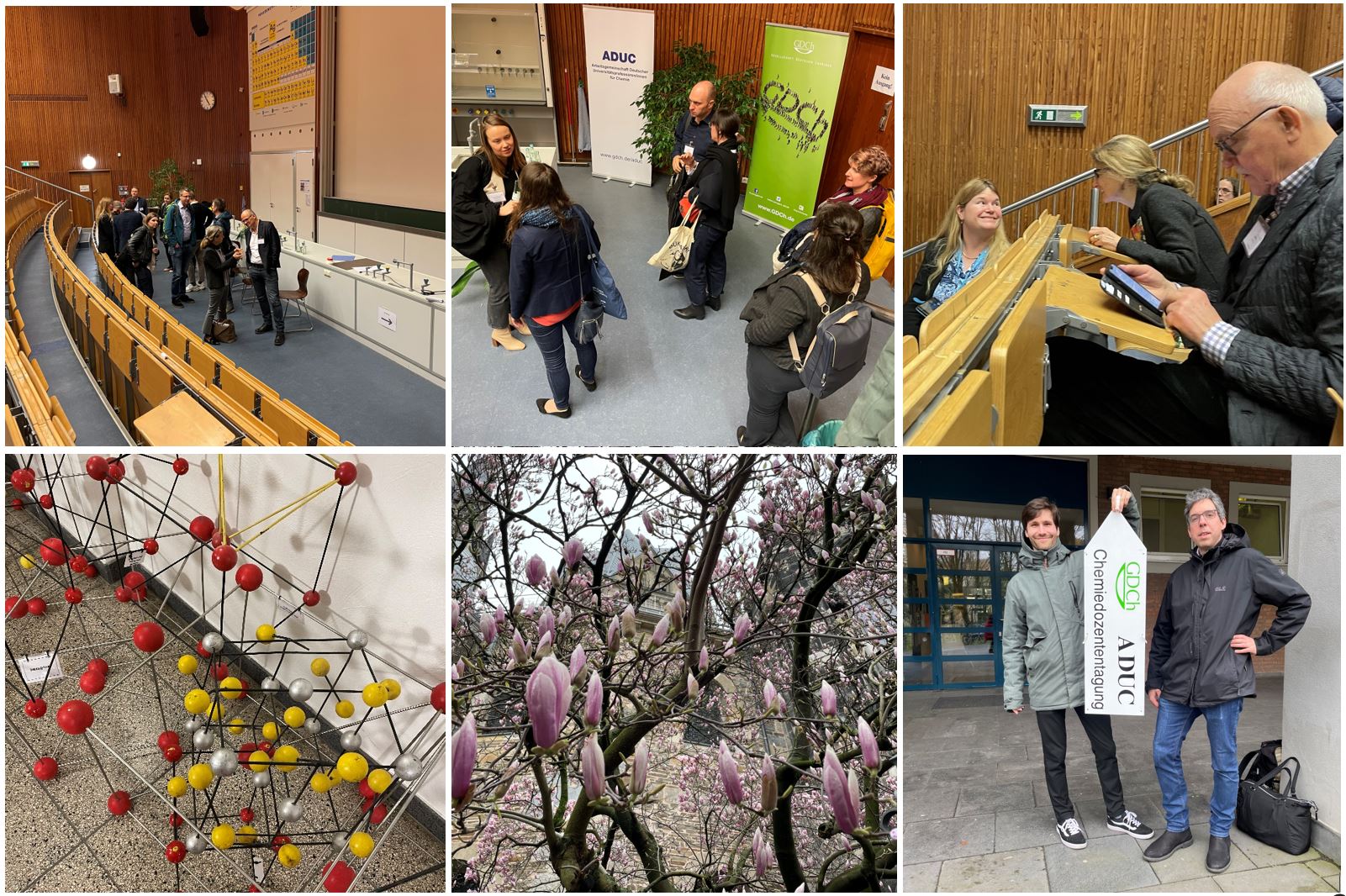
Figure 7. From top left to bottom right: Coffee break, exhibitor stands, post-lectures, models in the hallway, blooming magnolias, and Dr. Luca Blicker and Dr. Christian Remenyi, Nachrichten aus der Chemie.
References
[1] Science connects – open discourse and international cooperation are essential, Mathematical and scientific societies oppose anti-democratic and nationalist approaches in Germany, Press Release 02/24, February 2, 2024. (accessed March 14, 2023)
[2] H. Hersbach, B. Bell, P. Berrisford, G. Biavati, A. Horányi, J. Muñoz Sabater, J. Nicolas, C. Peubey, R. Radu, I. Rozum, D. Schepers, A. Simmons, C. Soci, D. Dee, J.-N. Thépaut, ERA5 hourly data on single levels from 1940 to present, Copernicus Climate Change Service (C3S) Climate Data Store (CDS) 2018. https://doi.org/10.24381/cds.adbb2d47 (accessed March 13, 2024)
[3] ERA5 daily mean sea surface temperature (°C) averaged over the extra-polar global ocean (60°S–60°N), Copernicus Climate Change Service/ECMWF (accessed March 13, 2024)
[4] Ariaan Purich, Edward W. Doddridge, Record low Antarctica sea ice coverage indicates a new sea ice state, Commun. Earth Environ. 2023. https://doi.org/10.1038/s43247-023-00961-9
[5] Afraa H. Kamel, Qusay F. Alsalhy, Salah S. Ibrahim, Khalefa A. Faneer, S. Abdollatif Hashemifard, A. Jangizehi, S. Seiffert, Michael Maskos, Alireza Shakeri, Christoph Bantz, Novel sodium and potassium carbon quantum dots as forward osmosis draw solutes: Synthesis, characterization and performance testing, Desalination 2023, 567, 116956. https://doi.org/10.1016/j.desal.2023.116956
[6] F. Tristram, N. Jung, P. Hodapp, R. Schröder, C. Wöll, S. Bräse, The Impact of Digitalized Data Management on Material System Workflows, Adv. Funct. Mat. 2024. https://doi.org/10.1002/adfm.202303615
[7] P. Tremouilhac, A. T. C. Nguyen, Y.-C. Huang, S. Kotov, D. Lütjohann, F. Hübsch, N. Jung, S. Bräse, Chemotion ELN: An Open Source Electronic Lab Notebook for chemists in academia, J. Cheminform. 2017, 9, 54. https://doi.org/10.1186/s13321-017-0240-0
[8] P. Tremouilhac, C.-L. Lin, P.-C. Huang, Y.-C. Huang, A. Nguyen, N. Jung, F. Bach, R. Ulrich, B. Neumair, A. Streit, S. Bräse, The repository Chemotion: infrastructure for sustainable research in chemistry, Angew. Chem. 2020, 22771-22778. https://doi.org/10.1002/anie.202007702
[9] P. Tremouilhac, P.-C. Huang, C.-L. Lin, Y.-C. Huang, A. Nguyen, N. Jung, F. Bach, S. Bräse, Chemotion repository, a curated repository for reaction information and analytical data, Chem. Meth. 2021, 8-11. https://doi.org/10.1002/cmtd.202000034
[10] Video: ChemASAP – the Automated Synthesis and Analysis Platform KIT (accessed March 14, 2024)
[11] Primo Levi Prize for Henning Hopf, ChemistryViews 2023.
[12] Vera Koester, Rethinking Chemistry—WiFo 2023, ChemistryViews 2023. https://doi.org/10.1002/chemv.202300065
[13] Gmelin-Beilstein Memorial Medal 2024, ChemistryViews 2024.
[14] Book series “Lives in Chemistry”, GNT-Verlag GmbH, Berlin, Germany. (accessed March 14, 2024)
[15] Maier, Helmut, Chemiker im “Dritten Reich”: Die Deutsche Chemische Gesellschaft und der Verein Deutscher Chemiker im NS-Herrschaftsapparat, 1. Aufl., Wiley-VCH, Weinheim, Germany, März 2015. ISBN: 978-3-527-33846-7
[16] R. Sievers, M. Sellin, S. M. Rupf, J. Parche, M. Malischewski, Introducing the Perfluorinated Cp* Ligand into Coordination Chemistry, Angew. Chem. Int. Ed. 2022. https://doi.org/10.1002/anie.202211147
Also of Interest

Award honors significant contributions to both the chemical community and society in general
 Event Highlight: Rethinking Chemistry—WiFo 2023
Event Highlight: Rethinking Chemistry—WiFo 2023
We need to broaden our perspective, look at chemistry from a new angle, and strengthen the interactions between the different disciplines

John Jolliffe, NFDI4Chem, on good research data management for chemists, electronic lab notebooks, their scientific benefits, and scientists’ fears

Eva E. Wille honored for extraordinary commitment to the development of the chemical literature

A ferrocene core surrounded by ten mercury atoms and ligands
